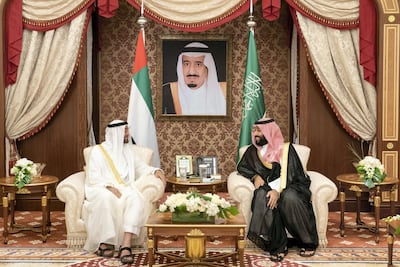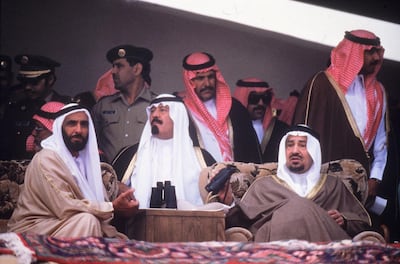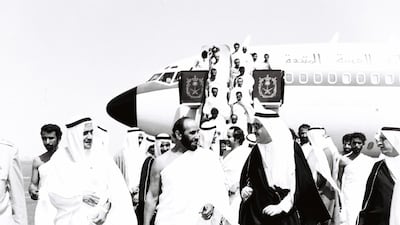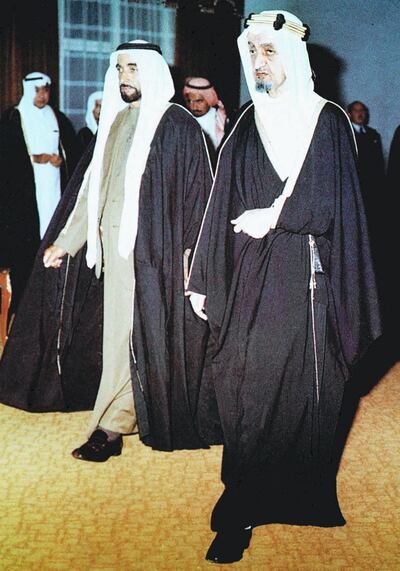Fireworks, illuminated buildings and the inevitable parade of supercars are part of this year’s Saudi National Day celebrations in the UAE with leaders describing the two nations as having “one pulse.”
President Sheikh Khalifa sent a message on Saturday to the Custodian of the Two Holy Mosques King Salman on the occasion of the country’s 88th national day.
In his wishes, the Crown Prince of Abu Dhabi congratulated Riyadh on expanding its global presence and spoke of the UAE and Saudi growing closer as “brothers.”
In a Twitter post accompanied by pictures of the UAE leaders with King Salman, Sheikh Mohammed bin Zayed, Deputy Supreme Commander of the Armed Forces, said the UAE and Saudi Arabia have “one pulse” as ties between the nations strengthen every year.
Sheikh Mohammed bin Rashid, Vice President and Ruler of Dubai, shared a video charting the warmth between the leaders and the people.
He praised the achievements of the King and Crown Prince and also wished that “every year the UAE and the Kingdom of Saudi Arabia would grow closer together.”
Dr Anwar Gargash, Minister of State for Foreign Affairs, said that when we "work together, we succeed together" in a post on Twitter.
As part of the festivities, the Burj Khalifa turned green in honour of the Saudi flag, fireworks burst over Yas Island, and supercars brought the party to Dubai’s La Mer.
Traditional folk dancing was another highlight of the celebrations in the UAE.
This is the second year in which Saudi Arabia’s national day has formally entered the UAE calendar. Last year, cell phones displayed “UAE KSA Forever" in place of the usual network name to mark the holiday. The Twitter hashtag #together_always displayed next to it emojis of King Salman and Crown Prince Mohammed bin Salman.
These lighthearted fraternal celebrations underline a much deeper message: that relations between the two countries have never been better, nor their view of the world more similar.

Saudi Arabia and the UAE have a lot in common. Both were born as nations in the 20th century — Saudi Arabia in 1932 and the UAE on December 2, 1972.
They share a common language, faith and culture and the trading links between the two go back centuries.
Many UAE families have a Saudi branch, and the reverse is, of course, also true.
Both counties are rich in reserves of oil and gas that have made them some of the wealthiest countries in the world. They also understand that economic reforms and diversification are vital for a prosperous future.
This close relationship has been strengthening since the 1970s, when Sheikh Zayed bin Sultan became the first President of the UAE.
Territorial disputes that marred earlier relations were put to one side in the interest of the common good. The two countries stood side-by-side on the oil embargo imposed on the US for providing support to Israel in the 1972 war.
Nine years later, the formation of the Gulf Cooperation Council brought together the six countries of the Arabian Gulf to give the region a unified voice.

The inaugural meeting of the GCC saw Sheikh Zayed, a regular visitor to the kingdom, invite King Khalid bin Abdulaziz Al Saud and the four other Gulf rulers to Abu Dhabi’s Intercontinental hotel on May 25, 1981.
The street outside the same hotel was in 2014 renamed after King Abdullah bin Abdulaziz Al Saud, the Saudi Ruler at the time.
Behind the formalities, the countries have worked ever closer together on issues where they find a common interest. They were allies during the first Gulf War, committing troops for the liberation of Kuwait, while both have been strong voices condemning extremists groups such as the Islamic State.
But it's perhaps in Yemen where the two counties' ties have become the strongest. Both Saudi and the UAE have long been concerned about stability in nearby neighbours, and whose fears came true in September 2014 when Houthi rebels stormed the capital Sana’a and forced out the president and prime minister.
Fears that Yemen would disintegrate into civil war, with the Houthi rebels backed by Iran, and Al Qaeda gaining ground in the south and east, the two countries formed an unprecedented military alliance to restore both legitimate government and stability.
The commitment to that alliance has been forged on the battlefield as the Houthis have been driven steadily back at a price paid in blood by the soldiers of both the UAE and Saudi Arabia.
The ongoing dispute with Qatar has seen even closer relations.
Two years after the accession in 2015 of King Salman, his son, Prince Mohammed bin Salman was named Crown Prince. A dynamic reformer, Prince Mohammed has found a natural supporter in Sheikh Mohammed bin Zayed, Crown Prince of Abu Dhabi and Deputy Supreme Commander of the UAE Armed Forces.
The two men obviously share a warm relationship that goes beyond the diplomatic, presenting a unified front on issues like the dangers of Iranian influence in the region and the dispute with Qatar.
Last year saw the creation of the Saudi-Emirati Co-ordination Council, heralding an era of even closer co-operation between the two countries in areas such as defence, politics and culture. One of the first acts was an agreement to work together on all forms of crime, including drugs trafficking, and better sharing of information.
_______________
Read more:
Saudi-Emirati Co-ordination Council meets in Jeddah
Saudi-Emirati Coordination Council will strengthen already tight bonds
Saudi-Emirati Co-ordination Council: all you need to know
______________
With the second meeting of the Saudi-Emirati Coordination Council taking place in Jeddah this month, work is under way on 175 projects and initiatives that include a Dh5 billion agriculture investment fund and joint investment ventures for renewable energy and small and medium business.
Together, the two countries have a GDP of US$1 trillion dollars, with joint exports ranking as fourth in the world.
The political and economic significance of this relationship is recognised by other world leaders. When Imran Khan, the new prime minister of Pakistan made his first official trip overseas last week, his hosts were both the UAE and Saudi Arabia.
In his visit to Jeddah for the second meeting of the Saudi-Emirati Co-ordination Council this year, Sheikh Mohammed bin Zayed described Saudi Arabia as “our second home.”
“We have a historic opportunity to create an exceptional Arab model of co-operation,” he said.
"Our solidarity and unity protect our interests, strengthen our economies and build a better future for our peoples.”



